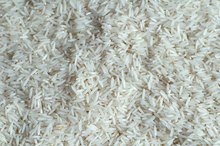The Effect of Removing Sugar & White Flour From the Diet
Sugar and white flour comprise two of the three most common forms of carbohydrates: sugars and starches. Although sugar is an example of a simple carbohydrate and white flour is an example of a complex carbohydrate, both have the net effect of rapid metabolism that can cause spikes in blood sugar levels. Because of the rate at which these substances metabolize, along with their lack of nutritional value, removing sugar and white flour from your diet can have a positive effect on your health.
Nutrition
According to Nutrient Facts, an online nutrient database, 2 teaspoon of granulated sugar provides 30 calories, 8 grams of carbohydrates and has no other nutritional value. An identical amount of unenriched white flour provides 20 calories, 4 grams of carbohydrates and again no other nutritional value. Enriched flour does provide small amounts of riboflavin, thiamin, niacin and folate.
Identification
No Starch Diet Plan
Learn More
According to Felicia Drury Kliment, author of “Eat Right for Your Metabolism,” the fiber content in a food determines how quickly metabolism proceeds 1. Foods higher in fiber take longer to digest and release glucose into your bloodstream at a slow rate. In contrast, the sugar and starch in refined foods metabolize quickly and release glucose to your bloodstream all at once. As blood sugar spikes, your pancreas begins secreting large quantities of insulin that stimulate glucose absorption into cells and body tissues. According to Kliment, this insulin overload then causes blood sugar levels to plummet and leaves you feeling hungry, creating a cycle glucose-induced food cravings.
- According to Felicia Drury Kliment, author of “Eat Right for Your Metabolism,” the fiber content in a food determines how quickly metabolism proceeds 1.
- According to Kliment, this insulin overload then causes blood sugar levels to plummet and leaves you feeling hungry, creating a cycle glucose-induced food cravings.
Potential
Kliment states that because sugar and white flour stimulate your appetite and cause food cravings, they have the potential to result in weight gain. In addition, their lack of nutritional value can have an effect on your overall health if you continually choose foods containing these ingredients rather than high-nutrient foods. Finally, your risk of developing or worsening diabetes increases significantly when your diet includes large amount of refined foods such as sugar and white flour.
Effects
List of Slow-Release Carbohydrate Foods
Learn More
According to Dr. Gabe Mirkin, author and multidiscipline health specialist, removing refined carbohydrates sugar and white flour from your diet will improve your overall health. Dr. Mirkin states that in addition to increasing your risk of becoming obese and/or developing diabetes, refined carbohydrates also increase your risk of developing high cholesterol and high blood pressure.
Solution
Just as the wrong type of carbohydrates can negatively affect your health, so can eliminating carbohydrates from your diet. Carbohydrates provide energy your body and brain must have to function and remain alive. The Harvard School of Public Health states that rather than refined carbohydrates, you select complex carbohydrates such as whole grains, old-fashioned oatmeal, brown rice and dried beans that protect rather than harm you.
Related Articles
References
- Eat Right for Your Metabolism; Felicia Drury Kliment
- Cleveland Clinic. Glycogen storage disease (GSD). Updated August 2, 2019.
- Poti JM, Braga B, Qin B. Ultra-processed food intake and obesity: What really matters for health-processing or nutrient content?. Curr Obes Rep. 2017;6(4):420-431. doi:10.1007/s13679-017-0285-4
- Winwood-Smith HS, Franklin CE, White CR. Low-carbohydrate diet induces metabolic depression: A possible mechanism to conserve glycogen. Am J Physiol Regul Integr Comp Physiol. 2017;313(4):R347-R356. doi:10.1152/ajpregu.00067.2017
- Hervik AK, Svihus B. The role of fiber in energy balance. J Nutr Metab. 2019;2019:4983657. doi:10.1155/2019/4983657
- Kunzmann AT, Coleman HG, Huang WY, Kitahara CM, Cantwell MM, Berndt SI. Dietary fiber intake and risk of colorectal cancer and incident and recurrent adenoma in the prostate, lung, colorectal, and ovarian cancer screening trial. Am J Clin Nutr. 2015;102(4):881-90. doi:10.3945/ajcn.115.113282
- Slavin J, Carlson J. Carbohydrates. Adv Nutr. 2014;5(6):760-1. doi:10.3945/an.114.006163
- Reynolds A, Mann J, Cummings J, Winter N, Mete E, Te Morenga L. Carbohydrate quality and human health: A series of systematic reviews and meta-analyses. Lancet. 2019;393(10170):434-445. doi:10.1016/S0140-6736(18)31809-9
Writer Bio
Based in Green Bay, Wisc., Jackie Lohrey has been writing professionally since 2009. In addition to writing web content and training manuals for small business clients and nonprofit organizations, including ERA Realtors and the Bay Area Humane Society, Lohrey also works as a finance data analyst for a global business outsourcing company.







